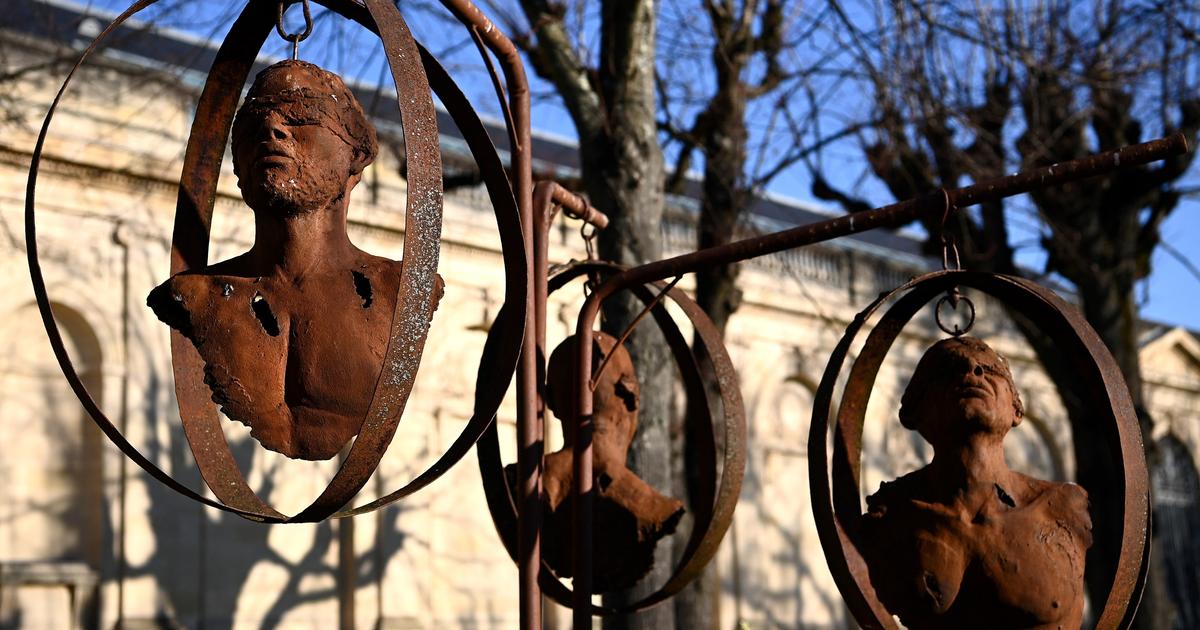After having remained silent for decades about its slave trading past, Bordeaux is seeking to catch up on the thorny question of the duty of remembrance, far from being obvious between the municipality, historians and an association which is strained by its activism.
More than 30 years after Nantes, which examined its responsibility in the history of the French slave trade and triangular trade in 1992, Bordeaux is still trying to get rid of accusations of
“softness”
concerning it.
“There is change, in particular thanks to the massive arrival of Neo-Bordelais in recent years, less dependent on family taboos
,” believes Karfa Diallo, director and founder of the Mémoires et Partages association.
For this Franco-Senegalese activist who took up the issue at the end of the 1990s, it is
“Bordeaux society”
which is moving the lines in the face of the
“wait and see”
and
“follow-through”
of elected officials.
Some 500 slave expeditions left the Gironde capital for Africa between 1672 and 1837.
“Bordeaux, known worldwide thanks to wine, is a city proud of itself and does not like people to deal with subjects that could devalue it
,” believes Éric Saugéra, a Nantes historian who was the first to
“light the fuse”
by publishing the book
“Bordeaux slave port” in 1995.
We had to wait until 2009 for the Aquitaine Museum in Bordeaux to devote rooms to Atlantic trade in the 18th century and the slave trade, on the recommendations of a reflection committee instigated by the town hall.
And 2019 for the inauguration on the banks of the Garonne of a statue of Modeste Testas, an African slave deported to Santo Domingo and bought by people from Bordeaux then freed.
A statue created by sculptor Caymitte Woodly, representing Modeste Testas, a slave bought by two brothers from Bordeaux in the 18th century and then freed.
It was inaugurated on the occasion of the national holiday of the abolition of the slave trade and slavery.
PHILIPPE LOPEZ / AFP
Plusieurs rues portant le nom de négriers bordelais ont aussi été dotées de plaques explicatives après la mort de George Floyd aux États-Unis et le mouvement de déboulonnage de statues liées à l'esclavage. Des initiatives, impulsées par l'ancienne municipalité de droite, appréciées mais «insuffisantes», selon Karfa Diallo, pour qui la mairie écologiste «n'a pas non plus renversé la table» sur ce sujet depuis son élection en 2020.
Karfa Diallo organise dans Bordeaux des visites guidées sur les traces de la traite. Il milite pour la création d'une «Maison Esclavage et Résistances». Son association a installé fin janvier un comité de pilotage pour la création de ce «lieu dynamique de brassage d'idées, un espace de débat, de conférences et de recueillement» mais sans la représentation des collectivités locales.
À lire aussiBordeaux, ancien grand port négrier, organise des «journées de la mémoire» jusqu'au 23 mai
«On n'a aucun frein à aborder cette question. L'enjeu pour nous, c'est de réussir à trouver le point d'équilibre entre un récit qui s'appuie sur des faits historiques, sans pour autant tomber dans un récit militant», grince Baptiste Morin, conseiller municipal en charge du patrimoine. La municipalité écologiste - qui avait notamment ajouté aux premières plaques une mention de la loi dite Taubira reconnaissant dans la traite un crime contre l'humanité - souhaite en installer cinq nouvelles. Cette histoire suscite aussi des crispations chez certains descendants d'armateurs négriers, «très inquiets sur la façon dont on pourrait percevoir leur famille aujourd'hui», pointe M. Morin.
« On n'a pas à rougir de ce que l'on fait ici à Bordeaux, même si on a démarré plus tard que Nantes. On essaie de rattraper le retard »
Le maire de Bordeaux Pierre Hurmic«Les élites marchandes bordelaises ont pleinement profité du système esclavagiste et s'en sont enrichies», souligne le maire de Bordeaux Pierre Hurmic, tout en insistant sur sa volonté de «faire consensus, de rassembler» dans sa politique mémorielle, qui concerne aussi la Shoah. «On n'a pas à rougir de ce que l'on fait ici à Bordeaux, même si on a démarré plus tard que Nantes. On essaie de rattraper le retard», plaide-t-il. Mais pour l'historienne bordelaise Caroline Le Mao, «travailler sur la mémoire sans travailler sur le contenu historique, ça devient vide de sens».
This researcher, who regrets that historians are not sufficiently associated with the initiatives of the City or the Mémoires et Partages association, supports memory work aimed at the
“enslaved”
.
“Repairing also means giving life back to these people”
so as not to be
“just numbers
,” she says.
In this vein, the town hall wishes to create in the coming years a memorial dedicated to the victims of trafficking and slavery.
The Bordeaux expeditions alone led to the deportation of between 120,000 and 150,000 blacks.

